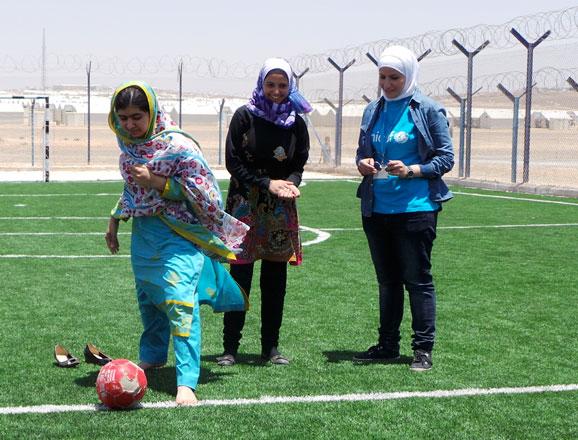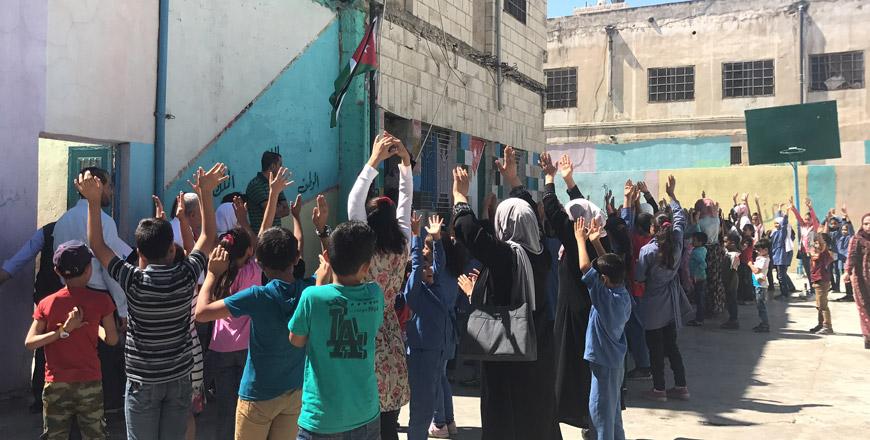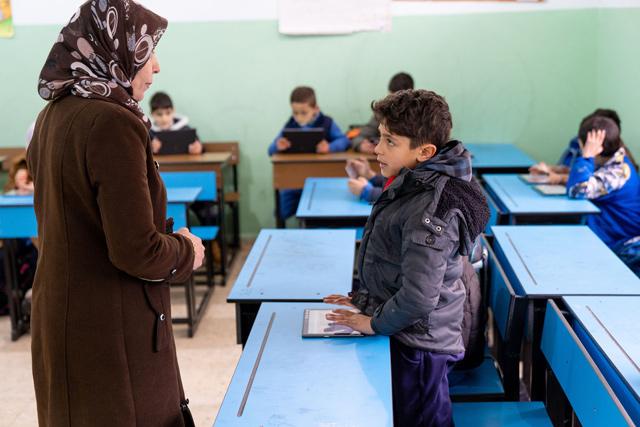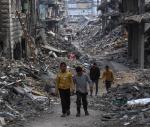You are here
Centre offers computer, language classes for children, elderly
By Muath Freij - Jul 27,2014 - Last updated at Jul 27,2014
BAQAA CAMP/AMMAN — A Syrian housewife’s duties towards her five children and family have not prevented her from pursuing the dream of learning how to use a computer.
Huriah Masri, a Syrian who is married to a Jordanian, said she began taking computer courses at Yarmouk Baqaa Club in the Baqaa Refugee Camp because she believes computer literacy is important in today’s modern life.
“My husband encouraged me to study because he wanted to ensure the whole family received adequate education. I am going to use the computer with my children after I finish my classes,” she told The Jordan Times in a recent interview at the club.
Masri, who is taking courses alongside her five children, is one of several women and children taking informal learning courses at Yarmouk Baqaa Club, which opened in 2008.
UNICEF has supported the centre through its partner programme, Relief International since 2007 and began directly supporting the centre in 2010 to ensure the sustainability of activities, capacity building and to regulate the cost effectiveness of community-based organisations, according to a UNICEF statement.
The club is one example of UNICEF’s “informal education” programmes, which are designed to encourage the education of Syrians and vulnerable Jordanians.
“UNICEF conducted a national appraisal of Syrians in need of informal education and it showed that around 60,000 Syrian children — in addition to other vulnerable Jordanians — would benefit from such a programme, having missed UNICEF schooling because they did not have access to schools or because they were involved in child labour,” UNICEF Communication Officer Fatima Azzeh told The Jordan Times.
UNICEF estimates that there are 220,000 school-aged Syrian children in Jordan, of which 150,000 are eligible for formal education. With more than 110,000 enrolled in schools across Jordan, there are an estimated 40,000 children out of school.
An additional 70,000 children are in need of alternative education, including informal and nonformal opportunities. This year, UNICEF is targeting 30,000 children with alternative education opportunities, according to UNICEF.
Sahar Ismael, the club’s programmes director, said around 2,000 Jordanians, 2,000 Syrians and 120 Iraqi children study at the club.
“Classes are classified into two stages; the first one consists of four classes and the second one consists of six classes,” she said.
Students categorised under stage two go to classes designed for a specific subject.
“This system helps them break the routine,” she added.
Girls study at the club every Monday and Wednesday and boys study every Sunday and Tuesday.
Rania Fawaz, a Jordanian who has been teaching mathematics at the club for one year, said one of the main difficulties teachers face is the difference between the Syrian and Jordanian curriculum.
“This means we spend more time teaching Syrian children, familiarising them with an alternate curriculum,” she said.
“Some also discuss political issues in class so it takes more effort to ensure they focus on the subject in hand,” Fawaz added.
Seventeen-year-old Raad Issa, a Syrian student, said the greatest difficulty he faced at school was the fact that the Jordanian curriculum differs from what he was learning in his country.
“I managed to overcome this obstacle when I began taking courses at the club,” he told The Jordan Times.
His mother, Ferial, noted that after she realised how beneficial the club was, she decided to enrol her seven children.
Masri noticed a marked improvement in the language skills of one of her children after he took Arabic classes at the centre.
“My children are really benefiting from the centre’s lessons,” she said.
Classes are designed to target the elderly, as well as children, according to Ismael.
“We hold a placement test to teach students accordingly. We classify students into two levels in accordance with the results of the test,” she stated.
Literacy students, who are classified under the first level, learn several subjects, including Arabic, English, mathematics and computer studies.
Related Articles
AMMAN — International education advocate and the youngest ever Nobel Peace Prize winner, Malala Yousafzai on Monday announced new support to
AMMAN — More than 3,000 school students are currently enrolled in the “Summer School Programme” initiated by the Ministry of Education and s
AMMAN — After being implemented in 100 public schools, benefitting 15,000 schoolchildren during the last academic year, UNICEF’s “Let’s Live



















